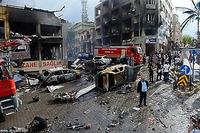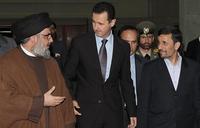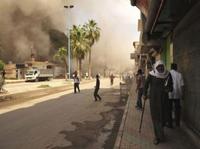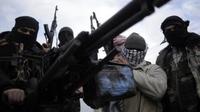-
The administration's struggle to define Benghazi attack as “terrorism”
Administration critics on the Hill now focus more of their attention on the changing explanations administration officials have offered in public as to the nature of the attack and the identity of the perpetrators. Yesterday, President Obama said the he used the term “terrorism” early on, and that he dispatched a senior official to brief lawmakers in the issue. He is right – up to a point: On 12 September Obama did describe the attack as an “act of terror,” and on 19 September counterterrorism director Matt Olsen used the term in response to a senator’s question, but otherwise, until 20 September, all high-level administration officials, including Obama, declined to attribute the attack to terrorists.
-
-
Saudi man arrested at Detroit airport with two pressure cookers in luggage

Hussain Al Khawahir, a Saudi citizen, was arrested Saturday at Detroit Metropolitan Airport after CBP agents found two pressure cookers in his luggage, and a page missing from his Saudi passport. He said he brought them for his nephew, a university student, because his nephew liked to cook lamb in a pressure cooker and U.S. pressure cookers were just not good enough.
-
-
Pro-Assad group attacks Turkish border town, killing 46

A Turkish group affiliated with a Syrian Alawite militia and operating on orders of Syrian intelligence, carried out a suicide attack Saturday in the Turkish city of Reyhanli, killing forty-six people. More than fifty people are still being treated in local hospitals. Reyhanli is an entry point for refugees fleeing violence in Syria. The attack will increase pressure on Turkey to become more involved in the Syrian conflict.
-
-
Pennsylvania emergency professionals receive WMD training
The Center for Domestic Preparedness (CDP) in Alabama hosted more than a hundred emergency professionals from the Pennsylvania South Central Mountains Regional Task Force’s Health and Medical Committee for in-depth response-to-WMD training.
-
-
Hezbollah increases role as protector of the Assad regime

With the anti-regime uprising in Syria evolving into a full-fledged ethnic conflict between the Alawite minority and the Sunni majority, the Assad regime relies more and more on Shi’a allies – Iran, Hezbollah, and the al-Maliki government in Iraq — to stay in power. Over the last three months, Hezbollah has been playing a growing, and more open, role in shoring up the regime.
-
-
Canadian company provides software to U.S. intelligence agencies
A Canadian company has spent the last few years locking up contracts to provide security software to U.S. federal agencies such as the NSA, CIA, and FBI. The company moved from the United States to Canada because the Canadian government gives tax credits for high-tech companies coming to Canada, and Canadian government agencies help the company break into new markets by sponsoring his company in international conferences. It was in one of these conferences that he once met “some NSA folks.”
-
-
U.S. sharply disputes UN official's claim that Syrian rebels used chemical weapons
The United States sharply challenged claims by a UN official – who is not a member of the UN investigative commission looking into to the possible use of chemical weapons in Syria – that the rebels, rather than the Assad regime, used sarin nerve gas near the city of Aleppo on 19 March. The UN investigative commission looking into the incident distanced itself from the official’s comments.
-
-
Heavy Israeli air strikes near Damascus destroy Iranian missile shipment to Hezbollah

Israel launched heavy airstrikes Friday and Sunday on a military base near Damascus, destroying shipments of sophisticated Iranian Fateh-110 missiles to Hezbollah. These were the second and third such strikes in as many months. Israel’s first strike on Syrian targets took place on 30 January. That strike destroyed advanced SA-17 surface-to-air missiles the Assad regime was trying to ship to Hezbollah on orders of Iran.
-
-
Chicago-area would-be terrorist to remain in jail

Last Friday a federal judge reversed the ruling of another judge and ordered that a Chicago-area teen accused of attempting to join al Qaeda-linked militants in Syria be kept in jail until his trail rather than be released to his family.
-
-
U.S. to keep Cuba on list of states sponsoring terrorism
The State Department said Wednesday that the Obama administration will not remove Cuba from the list of states sponsoring terrorism. Other countries on the list include Iran, Syria, and Sudan. The list is updated annually. Cuba sheltered Colombian and Basque terrorists, but with peace negotiations in Colombia, and with the Basque separatists announcing the end of their armed struggle, some analysts thought Cuba would be removed from the list this year.
-
-
House panel to hold hearings on marathon bombing
Representative Michael McCaul (R-Texas) said theHouse Homeland Security Committee will meet next week to hear testimony from Boston Police Commissioner Ed Davis and discuss the Boston Marathon bombing response methods and its implications for homeland security. “This will be the first in a series of hearings, as part of a broader investigation into the Boston Marathon bombings,” McCaul told reporters.
-
-
Woman who killed N.J. trooper in 1973 makes the FBI’s most wanted list
Joanne Chesimard, a former member of the Black Liberation Army who killed a New Jersey state trooper in 1973, has become the first woman to make the FBI’s most wanted list. The reward for her capture and arrest has doubled to $2 million. In 1979 Chesimard escaped jail, and since 1984 has been living in Cuba, using the name Assata Shakur.
-
-
Three of Dzhokhar’s friends charged with destroying evidence (Updated)

Three college students have been arrested on suspicion that they helped Dzhokhar Tsarnaev destroy evidence which would have provided details about his and his brother’s preparations for the marathon bombing. One of the three then lied to police when asked about their actions. The three are likely to face charges of conspiracy to obstruct justice. One of three will also be charged with lying to federal investigators.
-
-
Three friends of Dzhokhar arrested, charged with destroying evidence
Three college students have been arrested on suspicion that they helped Dzhokhar Tsarnaev destroy evidence which would have provided details about his and his brother’s preparations for the marathon bombing. One of the three then lied to police when asked about their actions. The three are likely to face charges of conspiracy to obstruct justice. One of three will also be charged with lying to federal investigators.
-
-
Canada considered deporting train terror suspect – but he was stateless
Raed Jaser, who is accused of planning an “al Qaeda supported” bomb attack aiming to derail a Canadian passenger train, was arrested nine years ago in Toronto and was facing deportation because he had a criminal record. Jaser is a Palestinian who grew up in the UAE. The UAE never gave his family a UAE citizenship, and they refused to take him back. The Canadian authorities say his case is not unique.
-
More headlines
The long view
How Male Grievance Fuels Radicalization and Extremist Violence
Social extremism is evolving in reach and form. While traditional racial supremacy ideologies remain, contemporary movements are now often fueled by something more personal and emotionally resonant: male grievance.
